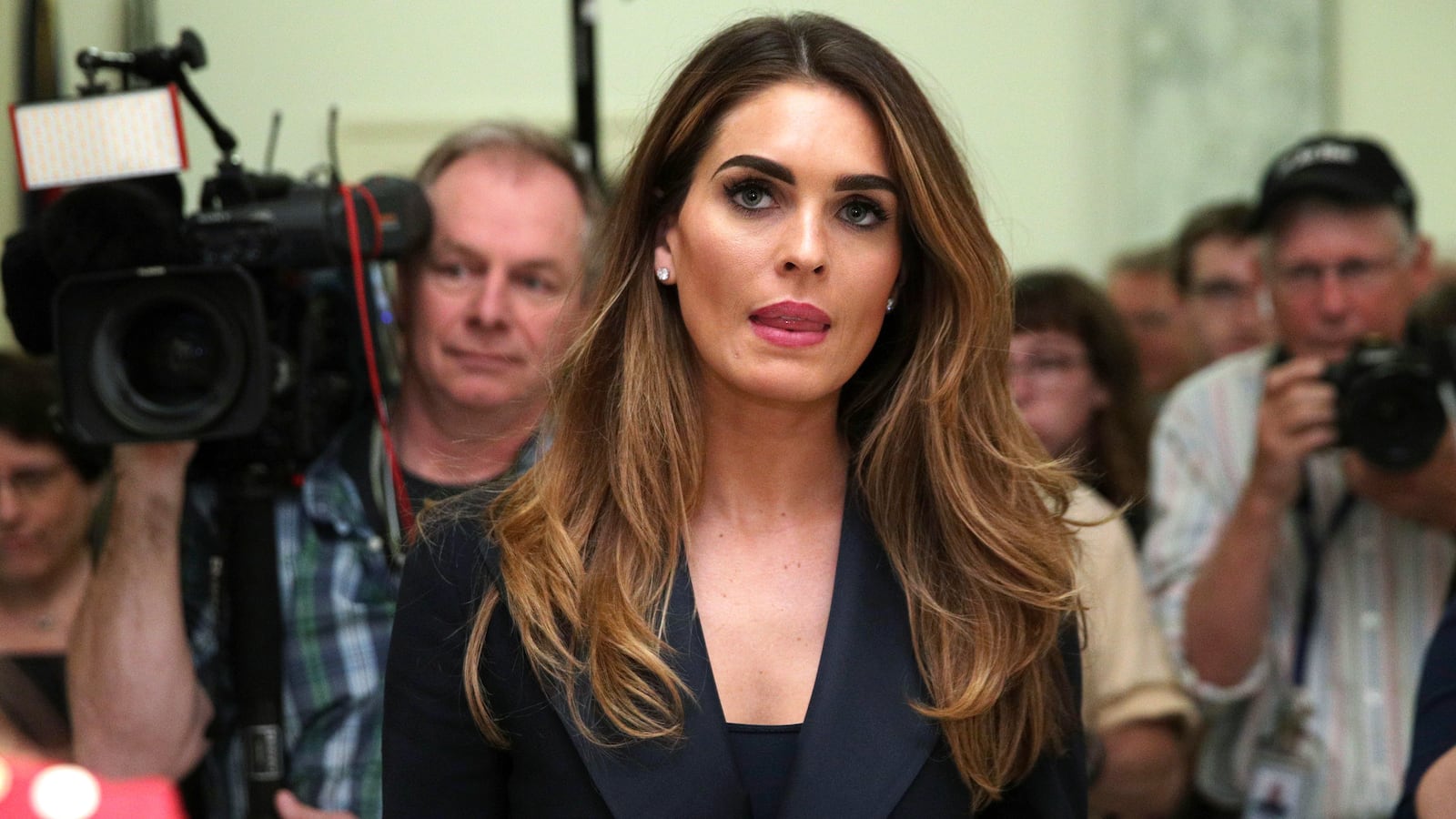“Hopey” Hicks, as the Donald calls her, may have been the least likely White House aide to defy President Trump.
“It’s a farce,” said Democrats as they left for their lunch break after a morning listening to her testimony.
Who wouldn’t be upset with someone who wouldn’t even answer where she sat in the West Wing (Answer: in the office closest to the Oval, where all Trump had to do was call “Hopey, Hopey” and she’d come running)? When Hicks tried to answer a question about getting former Attorney General Jeff Sessions to un-recuse himself from overseeing the Mueller investigation, she was cut off by counsel asserting blanket immunity. It was, said Democratic Rep. Ted Lieu, “obstruction of justice in action.”
Who wants to sit still for that? Spoiler: the Democrats on the Judiciary Committee, who always knew the White House position meant they’d learn little from Hicks. Privilege isn’t open to Hicks, after she waived it by appearing before the Mueller investigation. Instead, in a letter to Chairman Jerrold Nadler, White House counsel asserted that she was “absolutely immune” from discussing her tenure in the administration, period. Justification for that, apparently, is to come later.
For legal and emotional reasons, Democrats were thrilled that Hicks, as close to Trump as anyone save family, publicly defied the president by coming, even if only to assert that she could tell them nothing.
Still, she gave them something. Perhaps surprisingly, there’s no controlling legal authority defining the breadth of what aides can testify to. With all its limitations—in private, surrounded by lawyers, with a dry transcript to come days later—Hicks’ appearance gave Democrats, with no time to waste, a promising case to take to court to challenge the White House’s definition of immunity.
Presidents, both Democratic and Republican, give each other some leeway on the scope of testimony. They all treasure protection for their candid conversations. But even under the broadest interpretation, immunity doesn’t extend to where you sit at work. Nadler predicted after Hicks left, “We will destroy them in court.”
And Hicks also gave Democrats some much-needed drama as the first person from the inner circle to show up, which Woody Allen once defined as 80 percent of life. Her stilettos clicking down the marble halls of the Rayburn Building was the sound of the stone wall cracking, from the inside out.
Her closeness can’t be exaggerated. Think of her as the first female body man, or the daughter Trump didn’t have. As pretty as Ivanka (Hicks was a model for her clothing line) and as loyal, Hicks became the essential confidante Trump couldn’t live without. She had no husband or kids competing for her time, no prior business to protect, and no need to draw lines, however faint, over Charlottesville or children at the border to preserve her brand. With no relevant experience for the job, she was Trump’s first and only choice to be his campaign’s press secretary.
She was good at it—a Disney princess who could mollify the press while maintaining Trump’s trust. She parried with reporters about payoffs to a porn star and the cobbling together of an explanation on Air Force One (adoptions!) to explain Don Jr.’s leaping at a meeting with Russian operatives promising “dirt on Hillary.” So frequently in the room where things happened, Hicks appeared on more than 180 pages of the Mueller Report, almost on cue, whenever obstruction of justice was in the air. She persisted somehow without her designer dresses getting muddied.
After crushing it on the campaign, Hicks was named communications director in the White House at age 28, the Donald’s own Tom Hagan, the non-family member consigliere in The Godfather who would go further than Fredo and Sonny to secure his place. How far Hicks went, we don’t know, although she admitted to the House Intelligence Committee in 2018 that the job required that she occasionally tell “white lies.” Given that Trump’s told thousands of lies, it was likely many more than a few, and in fifty shades of gray.
It was after that admission became public that she resigned and fell into the waiting arms of Lachlan Murdoch, chairman of the Fox Corporation, where covering up is part of the job description. More than $85 million in payouts to victims of sexual harassment and attacks at the hands of Roger Ailes, Bill O’Reilly, and others were kept secret at Fox for years. No corporation is closer to Trump than the Murdochs'.
By taking a seat at the mahogany table, Hicks got to look like a good citizen, at least better than the likes of Don McGahn, the lawyer who Trump now calls a liar and who’s risking a contempt citation for resisting a subpoena. Hicks also threw a bone to frustrated Democratic committee members who may go easy on her later. At the same time, to her prior boss—and her new one—she’s proved she’s an employee who can be loyal.
There’s the possibility that the White House will remain one step ahead of Democrats. With only a transcript, we won’t hear her breathy voice, see her flinch at or dodge a question, gulp and reach for water, whisper to her lawyer. This could end up like the Mueller Report, little-read and subject to the spin of Trump and the consiglieres who’ve taken over since Hicks left.
All Democrats have is “see you in court.” But it’s more than they had Wednesday.







